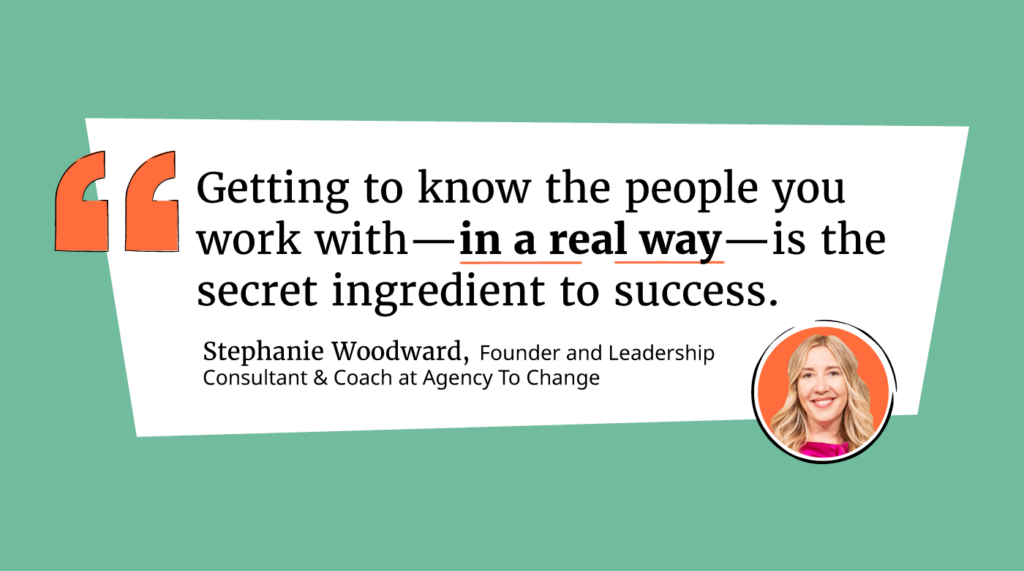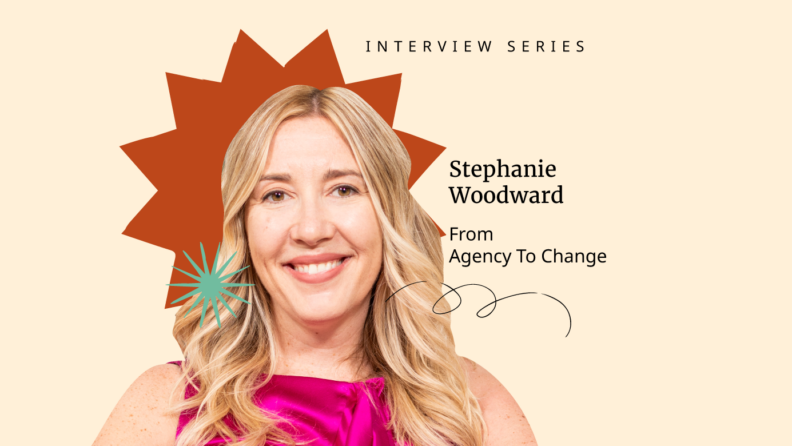We’re passionate about the world of work, and how we can make it better. To help satisfy our curiosity, we’ve launched an interview series where we pick the brains of experienced leaders, business owners, managers, and individual contributors to get their thoughts on how we can collectively build better workplaces.
We’d love to get to know you a bit better, tell us a bit about your backstory.
I am passionate about people, psychology, communications, personality, interpersonal dynamics, and I have an ongoing (and complicated) relationship with productivity. I love to accomplish and get things done, but I’m also conscious of my ongoing emotional and mental health. Meaning, ensuring balance, work-life harmony, and fulfillment across all areas of life is a particular interest of mine.

If we were to ask a friend to describe your personality to us, what would they say?
I think they’d use words like approachable, warm, ambitious, go-getter, empathetic, stellar listener, practical, introspective, curious and intuitive.
Thinking back to your career journey, what’s an interesting story that stands out?
I had the chance to work with a phenomenal CEO at one point in my career – a real visionary. That vision, though, meant massive change for the organization in terms of its service delivery model and big people impacts. This CEO broke a number of the change management “rules”—by sharing a lot of information early on that might have created unrest, anxiety, and turnover had it not been handled carefully and mindfully.
His willingness to move things forward at a pace that appropriately recognized the impact change can have on people, creating space for honest, open, and transparent dialogue, and genuinely responding to feedback and ideas from employees across the organization, stand out to me to this day and shaped how I approach change programs.
It demonstrated to me fairly early in my career that results and relationships go hand-in-hand and that people-minded leaders are better able to manage organizational change and create the conditions to navigate change successfully.
What’s the most impactful lesson you've learned over your career thus far?
I’ll refer back to Maya Angelou: “people will forget what you said, forget what you did, but they’ll never forget how you made them feel.” Results are important—critical for business success—but equally important is the human experience at work. When people feel seen, heard, and understood in the workplace, they are more committed to their role and outcomes.

Understand how they make sense of information, what motivates them, what interests them, and the roles and commitments they have outside of work—you’ll earn their trust in doing so.
Thanks for giving us some insight into who you are! Let’s jump into things. When you hear the phrase “build a better world of work”, what comes to mind?
The first couple of words off the top of my head: conversation and connection.
As a leadership coach and certified Psychological Health & Safety Advisor, much of my work is based on the 13 evidence-based organizational factors that contribute to psychological health and safety in the workplace from the Canadian Standards Council (CSC).
When it comes to conversation, I focus on specific discussions around five of the organizational factors that can set the foundation for work-life harmony and “building a better world of work”:
- Workload Management
- Balance
- Clear Leadership and Expectations
- Employee Engagement
- Psychological Support
Conversations around these factors allow for genuine connections between leaders and their teams. When these discussions occur, leaders are laying the groundwork for a better world of work, with the idea that the more engaged we are with the factors above, the better a workplace will be.
For you, what’s the main blocker you see as standing in the way of building a better world of work?
Seeing individuals as a means to a [business] end. Profits over people. Results over relationships.
There needs to be an emphasis placed on “and”: people and profits; results and relationships.
What’s one thing within our control that we can practically do to build a better world of work today? And, how do you recommend going about it?
I like thinking of it as: what is the first step I can take, or what step can I take today?
The first step many leaders can take is prioritizing huddles and one-on-one meetings. When stress levels rise and workload grows, the first thing that gets axed are these meetings.
There are many knock-on effects, but if you want to focus on building a better world of work in your team, prioritize the conversations and connections that come with these meetings. They don’t need to be long; they just need to be intentional and focused.
Why is this so important?
Your team will feel much more supported if you’re staying in contact with them and checking in to see how they’re adjusting to the stress levels or workload.
You’ll be providing clear leadership and helping provide support, which in turn could impact employee engagement, both during times of stress and during a typical workday.
Can you share one thing you’ve experienced, seen, or read about that is leading us towards a better world of work?
Through COVID, I’ve seen the best leaders and organizations really think about how to do things differently. This might have meant innovative approaches to how they deliver service to clients and customers, but it also meant thinking differently about how work is done within the organization.
I’m not just talking about hybrid work and managing virtual and in-office leadership (though that IS a big shift), I’m also talking about psychological health and safety in the workplace. I think we had a shared, collective lesson in mental and emotional health throughout the pandemic. The best leaders and organizations have a new (or deeper) understanding and appreciation of how outside circumstances impact how people show up at work.
I think this collective lesson will help all of us better empathize now at the individual level when someone talks to us about life circumstances and their emotional and mental health. Work is better when everyone realizes that we all have fluctuations in our mental and emotional health; we all experience life circumstances that can impact how we show up at work.
The key is being able to talk about, and manage through, those fluctuations in a supportive and productive way, together.
I’m curious, thinking about building a better world of work, is there a company and/or leader who stands out to you as someone we should follow? If so, what are they up to?
Brene Brown—specifically her work stemming from two of her books: Dare to Lead and Atlas of the Heart.
Her work and teachings epitomize the “and” I described above: how to lead in a way that serves people and profits, results and relationships. What I love most is the practicality of her teachings.
Her research is rigorous, thorough, and spans decades, yet she manages to translate all of that academic work into practical and meaningful tools and practices for leaders and individuals. Her podcasts, Dare to Lead and Unlocking Us are at the top of my playlist every week.
How can our readers follow your work?
My upcoming book: The Big Scale Back: Success and Balance By Your Own Design will be available October 25th. You can sign up at stephaniewoodward.com to access extra bonus resources and be notified when the book is available
Read my latest leadership resource: Setting The Foundation for True Work-Life Fulfillment
Add Your Voice To The Conversation
Join our interview series and share your ideas for how we can build a better world of work!


